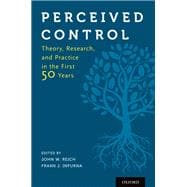The concept of the "locus of control" is one of the most influential in all of the psychological sciences. Initially proposed by Julian Rotter in 1966, the year 2016 marks the 50th anniversary of this remarkable breakthrough, subsequently inspiring thousands of research studies in the human sciences--research that has only served to deepen the utility of this amazing concept.
Edited by John W. Reich and Frank J. Infurna, Perceived Control: Theory, Research, and Practice in the First 50 Years commemorates this important anniversary by featuring contributions from leading figures of the time--some of whom were there at the very beginning of Rotter's extraordinary breakthrough--to give readers a valuable historical record and measuring stick to illustrate how far we've come. Other contributors to this volume expertly present contemporary and cutting-edge summaries of the current state of our knowledge all while giving us a roadmap for future developments and directions. What have these developments revealed about basic human strengths and
capacities? Why has this concept proven so remarkably effective in illuminating our everyday life in sickness and health?
Perceived Control is a fascinating work that incorporates research from Rotter's original concept, and addresses many of the leading comparable concepts that have since evolved: self-efficacy, personal mastery, competence, primary and secondary control, and more specific topics such as health locus of control,learned helplessness, and other heuristic concepts discussed in many different fields of psychology and the allied disciplines.
As Perceived Control skillfully attests, Rotter's work continues to thrive, leaving little doubt that its infl uence will endure for another half century or more.








